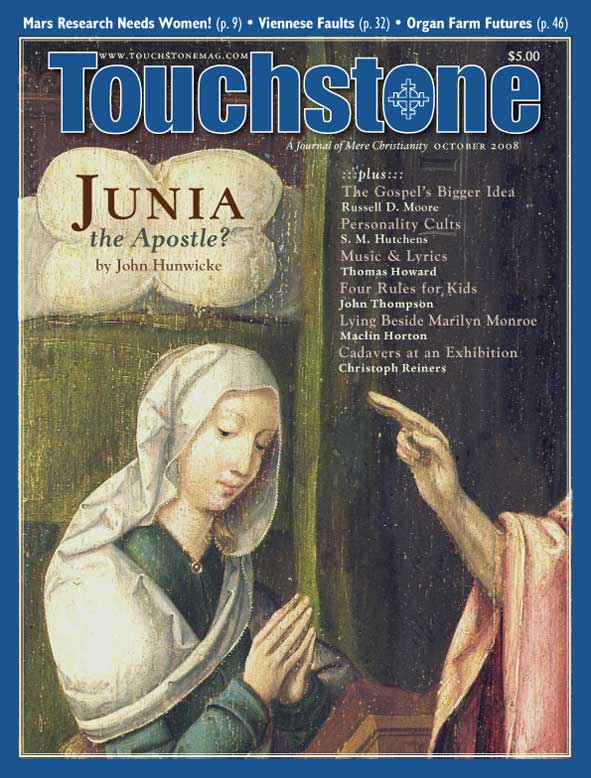View
Weed Free
John Thompson on Tending a Child’s Garden of Influences
It is good to want someone to control the violence, irreverence, and sex that appear in the media, so that children aren’t exposed to stories and images that corrupt their desires and dull their consciences. That would be a good thing for society as a whole. But for the sake of my wife and our three children, I have to draw the line at a different place.
The Four Rules
And so my wife and I follow four rules of disengagement. The first one is: If it is addictive, don’t offer it to children. In our family, that means alcohol, smoking, and drugs. It also means video games, television, Gameboys, and iPods.
We play games, but we do it as a family and we promote the games that encourage thought and interaction, not the acuity of the thumbs and fingers. We watch videos, but not television, and we certainly don’t watch television “serially.”
But the real struggle, the real area where the discipline is needed, is in how we—the parents—live and in the way we spend our money and time. Here is where the most effective teaching takes place, for good or ill, because, as everyone knows, our children pay much more attention to what we do than to what we say.
Hence, the second rule of disengagement: You should want your children to imitate you. This is one of the hardest rules to follow. It is annoying beyond words, at times, to see my children copying me. But then I remember that if I want them to remain disengaged from what will harm them, they must be able to attach themselves to a positive influence. Me.
This leads to the third rule of disengagement: Don’t give your children things that will isolate, spoil, or corrupt them. My childhood preceded the Sony Walkman phenomenon, which is now the iPod phenomenon. The music you can get on them is truly amazing, both in variety and in quality of reproduction. I don’t object to persons who use them, unless that person is one of my children.
I am perhaps irrationally afraid that my children will use their iPod or CD player or whatever to escape something unpleasant, whether it is boredom, a sibling, or my discipline. Instead, they should be learning to deal constructively with their boredom, siblings, and parental discipline.
Withdrawing into his own world is an ever-present temptation for a child, as tempting as candy. It should come as no surprise, therefore, that following rule No. 2, I don’t use these devices myself.
Our fourth rule of disengagement is: Even when giving the children gifts, teach them about the rewards that they should be working for. When we give them gifts, we are giving them some clues about what we think will make people happy. That is why I object, in principle, to expensive toys that have no functional use. They imply that happiness comes from being able to afford expensive toys. This is an unfortunate concept for children to have but it is disastrous for adults.
Engaging Maturity
These are not rules for rejecting society or for withdrawing from it. They are rules for equipping my children to selectively engage the world when they are mature enough to assess its merits and dangers. One of the most compelling arguments for disengagement is that the attitudes and values that society encourages effectively preclude the values that I want to cultivate.
You can only grow so many plants in your garden. Some of the plants I want to see flourish in my garden—gratitude, reverence, simplicity, and the love of beauty—are relatively fragile and require special attention, and so I must go to what others regard as extreme lengths—a radical weeding policy—to protect them.
John Thompson is a librarian and professor at Waynesburg University, Waynesburg, Pennsylvania
subscription options
Order
Print/Online Subscription

Get six issues (one year) of Touchstone PLUS full online access including pdf downloads for only $39.95. That's only $3.34 per month!
Order
Online Only
Subscription

Get a one-year full-access subscription to the Touchstone online archives for only $19.95. That's only $1.66 per month!
bulk subscriptions
Order Touchstone subscriptions in bulk and save $10 per sub! Each subscription includes 6 issues of Touchstone plus full online access to touchstonemag.com—including archives, videos, and pdf downloads of recent issues for only $29.95 each! Great for churches or study groups.
Transactions will be processed on a secure server.
more on family from the online archives

31.5—September/October 2018
Errands into the Moral Wilderness
Forms of Christian Family Witness & Renewal by Allan C. Carlson
more from the online archives
calling all readers
Please Donate
"There are magazines worth reading but few worth saving . . . Touchstone is just such a magazine."
—Alice von Hildebrand
"Here we do not concede one square millimeter of territory to falsehood, folly, contemporary sentimentality, or fashion. We speak the truth, and let God be our judge. . . . Touchstone is the one committedly Christian conservative journal."
—Anthony Esolen, Touchstone senior editor












